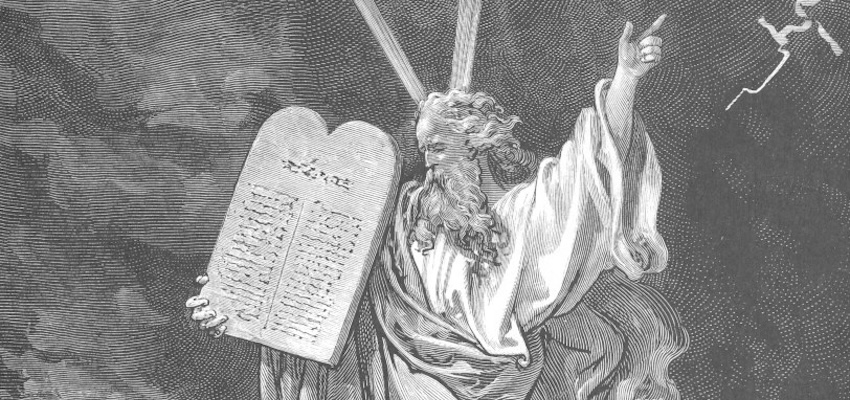
Predictably, the recent proposed Texas and Louisiana laws that would require public school classrooms to display the Ten Commandments generated rhetorical legal controversies, driven by the selectively vigilant left—vigilant, that is, with regard to anything that smacks of traditional morality (you know, the morality that works because it reflects what human beings are). Democratic state senator James Talarico argued that the Texas law would threaten democracy. Daniel Darling, a Baptist seminary professor, refutes Talarico’s claim in the pages of WORLD, arguing that the Decalogue has general historical significance for the U.S. and for the development of the common law tradition. Thus, the display is not of specific Christian significance, but of wider cultural importance.
At the National Catholic Register, Andrea M. Picciotti-Bayer exposes some of the trivial objections (including that the ordering of the Commandments is a specifically Protestant one) and makes a fine case that the mere presence of such a text does not constitute a violation of the Constitution. Liberals are fond of accusing conservatives of engaging in censorship—for instance, when attempts are made to ensure school libraries have age-appropriate reading material. Yet it would appear that they themselves are in favor of censoring morality. Good to know.
However, those who oppose the legislation need not panic. In a nation ruled by a pro-gay president, it is unlikely that a major, top-down imposition of Christianity on the public square will occur anytime soon. More significantly, very few Christians themselves take the Ten Commandments seriously these days. In the past, when similar controversies arose, I often told my students that I didn’t understand what all the fuss was about. “Most Christians only believe in a maximum of eight of them anyway. Why not post the Eight Commandments?”
Take, for example, the ban on images. This is routinely disregarded. Now, Orthodoxy, Catholicism, and Lutheranism have sophisticated arguments for this change. John of Damascus set the gold standard for a favorable approach to images, and his arguments proved influential, in the East and the West. Likewise Martin Luther, with his acute sensitivity to the revelation of God making himself small and frail in his grace toward sinners, saw depictions, especially of the crucifixion, as pedagogically and, indeed, theologically important. There are, then, serious and substantial arguments that the Incarnation changes the nature of the Torah’s ban on making images.
But most evangelical Christians have embraced images not because they read John of Damascus or grasped Luther’s theology of the Incarnation. That would imply a depth of principled reflection that typically isn’t there. Rather, other motivations are at play, shaped less by theological tradition and more by cultural trends. This is the world of The Chosen: If it gives the audience warm feelings about Jesus or leads to conversations with non-Christian neighbors, it is good. A form of religious utilitarianism rules the day.
Then there is the Sabbath. As with images, the role of the Sabbath in the Church has been highly contested over the years. Early Reformers, such as Luther and William Tyndale, rejected it. Later Puritans made its observance a hallmark of fidelity. But few, if any, were seventh-day people. They shifted it to Sunday. And again, with perhaps the sole exception of the most conservative Presbyterians and Reformed, few today observe even Sunday as a day devoted to worship. Witness the rise of Saturday night services—not due to theological conviction, but to keep Sunday free for beach trips and other forms of fun. So, intellectual laziness and casual cultural conformity have rendered two of the Commandments redundant. Why display all ten in the classroom?
Christian delinquency does not stop with these obvious examples. The cult of youth and the tendency in some circles to constantly disparage the previous generation of Christians raise questions about what it means to honor one’s father and mother. Lax attitudes to marriage and sexual conduct force us to consider whether the ban on adultery is really heeded in our churches. And then, perhaps above all, we must consider whether Christians today do not bear false witness. Anyone familiar with the loudest “Christian” voices on X will be aware of their need to casually slander others—typically other Christians.
The movement to display the Ten Commandments in public spaces is no doubt driven by a desire to promote character. What sane person, after all, would want to live in a society where dismantling families, disrespecting others, killing people, committing adultery, and telling lies are regarded as normative? Then again, plenty of evidence suggests that we are already living in such a society—in which case, these laws are instrumental in setting forth aspirational goals for our children.
But how can Christians champion the Ten Commandments as a moral standard if they themselves do not obey them? Yes, the Incarnation transforms the Decalogue. All Christian churches agree on that in principle. But most Christians disregard the Commandments without reflection and because they are inconvenient. That is the road to cultural impotence. The reformation of society must start with the reformation of our own families and churches, with a self-conscious attention to ethics and character formation. Just as the Church transforms individuals and makes them part of the body of Christ, so she will slowly but surely change the world outside. Until that happens, the secular world has little to fear.
The Church’s Answer to the World (ft. Carter Griffin)
In the latest installment of the ongoing interview series with contributing editor Mark Bauerlein, Fr. Carter Griffin…
Undermining the Church’s Public Witness
Bishop Thomas J. Paprocki recently wrote in these pages that the Archdiocese of Chicago’s plan to grant…
The Lost Art of Saying “No”
Conservative pundit Matt Walsh recently contended that “we have to recapture the long-lost art of saying ‘no.’”…

